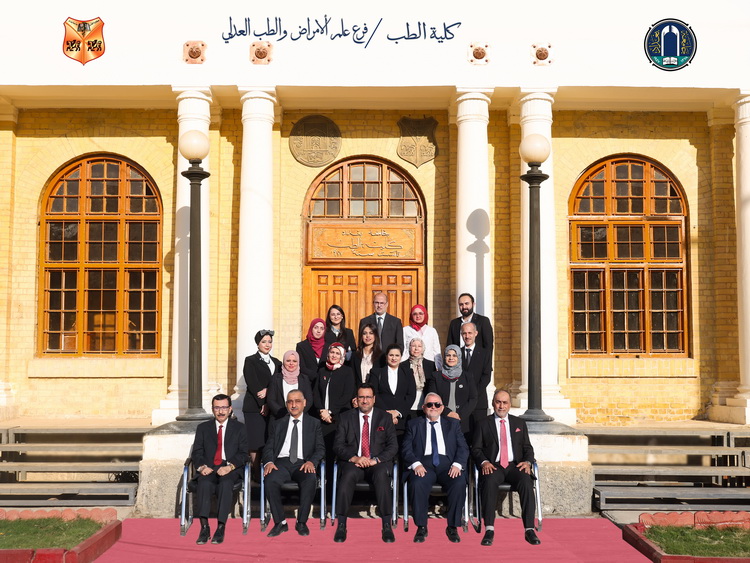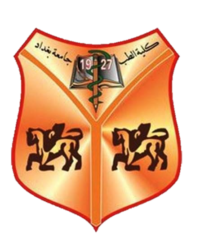
A brief summary of the Clinical Communicable Diseases Research Unit:
- The Clinical Communicable Diseases Research Unit was established with an idea and a scientific proposal by its founder, Prof. Dr. Abdel-Ridha Al-Abbasi, Associate Dean of the College of Medicine / University of Baghdad, and after being exposed to a terrorist threat, he left work outside the country in 2006.
- Assign a. M . Dr . Saad Hasan Mohammed Ali (Head of the Microbiology department at the time) and currently Director of the Clinical Communicable Diseases Research Unit, where he started his duties as Director on 15/9/2011
- A list was submitted about the reconstruction and preparation of work in the aforementioned unit at its location in the Microbiology department. However the donation of the Baghdad Governorate for the reconstruction of the building was delayed, in addition to that was the lack of all its equipment and supplies until the completion of the reconstruction in accordance with the conditions for the work of such advanced equipment, and this was another reason for the unit not to be activated . Because the unit was not activated, so we decided to start civil rehabilitation of the nucleus of the Clinical Communicable Diseases Research Unit after rehabilitating one of the abandoned and neglected laboratories in the microbiology department in June 2011. The unit was equipped with some important devices for its work as a first batch in 2011 and is waiting funding for the second and subsequent batches, according to the programmed processing for the Research and Development Department/Ministry of Higher Education and Scientific Research.
- This unit concerned with advanced clinical scientific research related to clinical communicable and infectious diseases, including those that are endemic in our country, as well as diseases that are transmitted from animals to humans, causing clinical and transitional diseases of all kinds and classifications, such as viral, bacterial, parasitic, fungal, and other diseases. It provides scientific advice, research and training services to all beneficiaries, including in the fields referred to above in the scientific and research institutions belonging to the Ministry of Higher Education and Scientific Research, as well as joint cooperation with other ministries such as health, agriculture and the environment with regard to the common scientific fields between them.
- The unit is still young and because of the conditions referred to in paragraph (First) above and the security and financial conditions of the state and the lack of actual allocation of the appropriate place for its establishment or the restoration of some of the multiple research laboratories for this unit in the College of Medicine due to the lack of huge financial allocations for such civil and laboratory works and decent modern laboratory equipment with such research units, the unit did not and based on the recent meeting in the Department of Research and Development, in the presence of His Excellency the Minister of Higher Education and Scientific Research, and his unlimited support for scientific research projects and the rehabilitation of its institutions, and with the support of the current Dean of the College of Medicine, Prof. Dr. Muhi Kadhem Wanass, where he allocated an area of 200 square meters from the Basic Sciences Building, first floor and converting them into scientific and research laboratories and administrative facilities to establish the unit on them and according to the attached engineering statements.
- Despite this, the following works have been accomplished for the unit.
- Some advanced laboratory devices and equipment have been purchased until the completion of the rest of the branches of microbiology, such as bacteriology, parasitology, elementary science, immunology, and molecular biology.
- Carrying out original research on avian influenza in the Kurdistan region, using the equipment and supplies of the educational laboratories of the Medical City, in cooperation with the World Health Organization and its branches in Cairo (NAMRO 3), and it was sent to the Research and Development Department for the purpose of evaluation, and it was approved on 18/4/2011.
- A short term plan:
- Designation of assistant professor Dr. Saad Hasan Mohammed Ali, acting director of this unit, commencing its work on 15/9/2011.
- Completing the rehabilitation and opening of other new laboratories according to the attached lists. Two teaching services have been transferred from the owners of the Microbiology department, namely: Prof. Dr. Mohammed Abdel-Akhwa Al-Fahham, PhD in Molecular Microbiology, who have a long experience in teaching, scientific research and supervision of thesis and dissertations of master's or doctoral students, as well as Dr. Ghanem Ibrahim Ahmed Al-Wadi, a teacher / PhD from France in virology and clinical immunology, as well as the activities of the scientific researcher, Jinan Mahdi AL-Abbasi.
- Completion of supplying the unit with scientific research equipment to accomplish its tasks.
- The long-term plan:
- Being open to conducting research in the field of clinical communicable diseases endemic in our country, starting with the Baghdad governorate, then expanding to the most remote governorates, according to the financial and logistical support available from the ministry and the university.
- Paying attention to scientific research in the field of clinical communicable diseases coming to the country, which pose a real threat to it and to the capabilities of our research staff, as it has not been dealt with at the level of diagnosis, treatment, and the carrier factors that are recognized in Qatar.
- Raise the name of Iraq high in the scientific field by publishing advanced scientific research and holding qualitative scientific seminars and conferences and participating in them.
- Training and developing the scientific, research and administrative capabilities of the cadres working in this unit inside and outside the country to perform the scientific tasks entrusted to it and at a high level of laboratory, diagnostic and research performance (scientific sobriety).
The Clinical Communicable Diseases Research Unit is the nucleus of discreet and pioneering scientific research in its academic and research fields at the Mother College of Medicine.
The basic mission of the Clinical Communicable Diseases Research Unit is to prepare for advanced diagnostic and clinical scientific research on health and medical problems in Iraqi society in the fields of microbiology, as well as its relationship to common diseases between humans and their environment.
- Conducting solid scientific research in the bacteriological, viral, parasitic and fungal fields, in addition to clinical immunology and molecular biology related to clinical transitional diseases of all kinds, as well as endemic and epidemiological diseases in our country.
- Cooperation in developing diagnostic plans and strategies with all parties related to this research, including (health, higher education and scientific research, environment and agriculture) to control communicable, clinical, endemic and epidemiological diseases in our country, starting from Baghdad governorate and then expanding to the most remote governorates, according to the available financial and logistical support from University of Baghdad and the Ministry of Higher Education and Scientific Research as well as those ministries related to the subject.
- Paying attention to scientific research in the field of clinical communicable diseases imported into the country, which pose a "real" threat to it and to the capabilities of our local research staff if it is not dealt with at the scientific level in diagnosis, treatment and the factors that transmit it in the country.
- Raising the name of our mother college high in the scientific field at the level of discreet Qatari research through publishing it in advanced Iraqi and international journals, as well as holding qualitative scientific seminars and conferences and participating in them.
Academic Staff – Department of Pathology and Forensic Medicine
For a complete and regularly updated list of faculty members in the Pathology and Forensic Medicine department, please visit the University of Baghdad Pathology & Forensic Medicine Repository .

